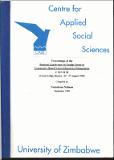| dc.contributor.author | Moetsabi, Titus | |
| dc.coverage.spatial | Botswana. | en |
| dc.coverage.spatial | Swaziland | en |
| dc.coverage.spatial | Zimbabwe. | en |
| dc.date.accessioned | 2016-03-15T10:48:09Z | |
| dc.date.available | 2016-03-15T10:48:09Z | |
| dc.date.issued | 1998-09 | |
| dc.identifier.citation | Moetsabi, T. (1998) Gender sensitive development at community level: experiences from Botswana, Swaziland and Zimbabwe. In: Nabane, N. (ed.) Proceedings of the Regional Conference on Gender Issues in Communitv-Based Natural Resource Management CBNRM (Cresta Lodge, Harare : 24 - 27 August 1998). Harare: CASS, pp. 19- 29. | en |
| dc.identifier.uri | https://opendocs.ids.ac.uk/opendocs/handle/20.500.12413/10049 | |
| dc.description | A conference paper highlighting the importance of involving women in viable, community-based projects that develop their communities as well as empower them to earn a living. | en |
| dc.description.abstract | Gender sensitive development in Southern Africa is characterized by both negative and positive trends at Community level. This is because gender sensitivity has been incorporated in development initiatives largely as an agenda for Northern NGOs and therefore essentially as a conditionality of technical and financial donor assistance. This top-down approach has not only been patronizing, haphazard and unsuccessful: it has also been alienating because the values it has sought to impose are Euro-centric, basically western and urban which have no significant relevance to the rural context of peasant women and men in Zimbabwe, Africa. By attempting to remove one form of oppression through another form of oppression, this strategy has been characterized by civil disobedience, as an anti-domination strategy, at community, extension worker and organizational levels that have successfully led to the failure of development activities following this line. On the other hand, there have been organizations which have initiated dialogue, as facilitators, at community level on gender sensitivity. This has been done through a multi-track communication strategy which involves the community themselves sharing knowledge and exchanging experiences on the kind of egalitarian development objectives and activities they aspire to achieve. The interface of community and change agents relations has been characterized by information, education and communication among the peasants themselves and, between the peasants and outside change agents. The result has been that the dominant perception, of what kind of gender sensitive development takes place, has been that of the peasants themselves, local cultures specific and friendly, enabling and empowering. This approach has been sustainable because it is revolutionary as the community defines its agenda and mobilizes itself in alliance with internal and external friends. | en |
| dc.description.sponsorship | The success of this conference and the publication of these proceedings has been possible through support from the US Agency for International Development (USAID) | en |
| dc.language.iso | en | en |
| dc.publisher | Centre for Applied Social Sciences (CASS); University of Zimbabwe (UZ) | en |
| dc.relation.ispartofseries | CASS Occasional Paper - NRM Series;CPN. 97 /98 | |
| dc.rights.uri | http://creativecommons.org/licenses/by-nc-nd/3.0/ | en |
| dc.subject | Economic Development | en |
| dc.subject | Gender | en |
| dc.subject | Rural Development | en |
| dc.title | Gender sensitive development at community level: experiences from Botswana, Swaziland and Zimbabwe | en |
| dc.type | Conference paper | en |
| dc.type | Series paper (non-IDS) | en |
| dc.rights.holder | University of Zimbabwe (UZ) | en |


